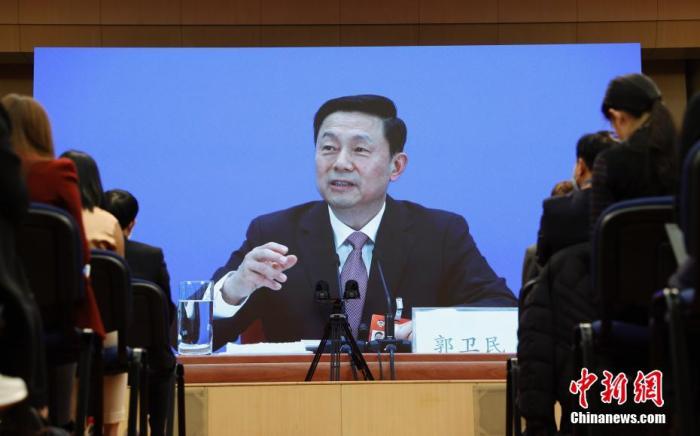On March 3, the press conference of the Fourth Session of the 13th CPPCC National Committee was held. The spokesperson of the conference Guo Weimin introduced the situation of the conference to Chinese and foreign media and answered questions from reporters.
On March 3, the press conference of the Fourth Session of the 13th National Committee of the Chinese People's Political Consultative Conference was held in Beijing. Guo Weimin, the spokesperson of the conference, briefed Chinese and foreign media about the conference and answered questions from reporters.
In order to effectively prevent and control the epidemic and jointly maintain public health and health, the press conference will be conducted in the form of online video.
The picture shows the reporter attending the press conference at the branch venue.
Photo by China News Agency reporter Du Yang
NBC reporter: At the press conference two years ago, you talked about improving communication with the world and telling Chinese stories better.
In the past two years, there have been some controversies in dealing with the new crown virus pandemic, Xinjiang, Hong Kong and other issues. Some observers believe that China’s image has continued to decline. For example, a survey showed that the proportion of Americans holding negative views of China has risen from 47%. To 73%.
Allow me to ask such a question: What went wrong?
Guo Weimin: Two years ago, we had exchanges on how to do a good job in external communication and the issue of China's image.
I think the question you asked today mainly involves two issues, one is the so-called international polls, and the other is the issue of China’s national image.
Guo Weimin: There are now some international polls evaluating China’s national image. The situation is diverse. It involves various factors such as which polling agency, the scope of the survey, the specific objects of the survey, and the data. The situation is also diverse. of.
Just now you mentioned the decline in China's national image. I think the reasons are also complicated.
Some are because some foreign people don't understand China, and some are because they are misled by certain anti-China politicians.
Guo Weimin: I want to say that everyone can see that for a period of time, some anti-China politicians have slandered China, fabricated rumors, and confused people on issues such as the epidemic, Hong Kong and Xinjiang. This has also caused some American and Western people. negative influence.
On these issues, the National Committee of the Chinese People's Political Consultative Conference is also actively working. Many members have actively spoken out to explain China's position, refute erroneous statements, and safeguard our national sovereignty, security and development interests.
Guo Weimin: Speaking of polls, there are also some international independent polling agencies recently. Their polls show that people in many countries and regions generally prefer China.
There is a Chinese proverb: It is better to see a hundred to hear.
I believe that as more and more foreigners come to visit China, and at the same time we are strengthening foreign exchanges and strengthening foreign cooperation, more and more people will like China, and the international community will continue to favor China. Promote.
Guo Weimin: Since China implemented reform and opening up, especially since the 18th National Congress of the Communist Party of China, the economy and society have developed rapidly and the people's living standards have been continuously improved.
Recently, international polls show that the Chinese people are very satisfied with the country.
With the increasingly close ties with the world, China has made positive contributions to world peace and development.
Many members of the CPPCC have long been engaged in foreign-related work. We have many old ambassadors, as well as members who have long been engaged in foreign cultural exchanges and foreign communication. They believe that China is promoting world economic growth, coping with climate change, achieving the United Nations poverty reduction goals, and actively participating in and Active efforts in supporting the global fight against the epidemic have played an important role, and have been positively evaluated and widely recognized by the international community.
China is developing exchanges and cooperation with more and more countries and regions, and constantly expanding our "circle of friends."
Last year, we signed the Regional Comprehensive Economic Partnership Agreement (RCEP), completed the China-EU Investment Agreement negotiations, and successfully held the third International Import Expo. I think these also illustrate this point from one side.
Guo Weimin: With this question from you, I would also briefly introduce our CPPCC's foreign exchanges.
Carrying out international friendly exchanges is an important function and an important task of the CPPCC National Committee.
In recent years, the CPPCC National Committee has actively carried out high-level exchanges and multi-level exchanges, strengthened contacts and communications with foreign political organizations, related institutions, media think tanks and people from all walks of life, actively participated in international multilateral activities, and formed a multi-domain, multi-channel, and multi-form external Communication pattern.
Up to now, the CPPCC National Committee has conducted friendly exchanges with 337 organizations and institutions in 157 countries and 15 international and regional organizations.
Guo Weimin: China is a peace-loving country. We have always made friends and formed good bonds.
The National Committee of the Chinese People's Political Consultative Conference will further utilize the unique advantages and characteristics of the Chinese People's Political Consultative Conference, actively carry out foreign exchanges, strengthen friendly cooperation with people of all countries, and actively promote the building of a community with a shared future for mankind.
(According to the text of the webcast)

